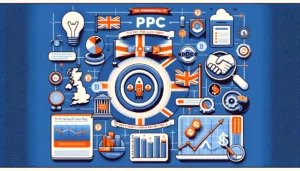Exploring Pay-Per-Click Advertising: What is PPC in the UK?

Pay-Per-Click (PPC) advertising stands as a cornerstone of digital marketing, particularly in the competitive UK market. This model allows businesses to bid on keywords and only pay when their ad is clicked, offering a high degree of flexibility and measurability. Understanding PPC is crucial for leveraging its benefits, which include immediate visibility on search engine results pages and precise targeting capabilities. As we delve into the world of PPC in the UK, we’ll explore its fundamentals, how to craft winning campaigns, the integration with SEO, and how to navigate the competitive landscape to maximise return on investment.
Key Takeaways
- PPC advertising in the UK involves bidding on keywords relevant to your business, paying only when ads are clicked, and requires strategic management for success.
- A successful PPC campaign hinges on thorough keyword research, effective bidding strategies, and the continuous testing and optimisation of ads.
- Synergising PPC with SEO can enhance overall visibility and effectiveness, leveraging insights from both for a comprehensive digital marketing strategy.
- Understanding the UK market specifics, including audience behaviour and competitive dynamics, is essential for optimising PPC campaigns and improving ROI.
- Continuous innovation and adaptation to market changes and consumer trends are key to maintaining a competitive edge in the UK’s PPC landscape.
The Fundamentals of PPC in the UK Market
Defining Pay-Per-Click Advertising
At its core, Pay-Per-Click (PPC) advertising is a model where you, as an advertiser, pay a fee each time your ad is clicked. This approach allows for immediate online visibility, a crucial advantage in the fast-paced UK digital market. PPC is not just about visibility; it’s about strategically attracting qualified traffic to your site.
When considering PPC, it’s essential to partner with a PPC agency that understands the nuances of the UK market. A specialised UK PPC agency can help you navigate the complexities of PPC marketing, including eCommerce, Amazon ads, and more, ensuring your campaigns are tailored to the audience you aim to reach.
- Conduct a thorough PPC audit to evaluate your current strategy.
- Identify areas for improvement, such as keyword relevance and bid adjustments.
- Leverage the expertise of a PPC ad agency to optimise your campaigns for better performance.
Remember, a successful PPC campaign is not set-and-forget; it requires continuous refinement and adaptation to the ever-changing digital landscape.
The Role of Search Engines in PPC
Search engines are the battlegrounds where the PPC wars are waged. As you venture into the realm of PPC advertising, it’s crucial to recognise that search engines are not just platforms; they are the arbiters of your ads’ fate. They determine the visibility and placement of your PPC ads, influencing how often and prominently they appear to potential customers.
To harness the full potential of PPC, you must understand the auction system that search engines use. Each time a user performs a search, an instant auction takes place. Here’s a simplified breakdown:
- A user enters a query.
- The search engine evaluates the advertisers’ bids and relevance.
- Ads that win the auction are displayed in the search results.
Relevance is as critical as your bid amount. It’s not enough to have deep pockets; your ads must also resonate with the searcher’s intent. Crafting ads that align with user queries and preferences can lead to higher ad rankings and lower costs per click.
Remember, your goal is to make every click count. This means optimising your ads for both performance and cost-efficiency. A well-executed PPC campaign leverages search engine algorithms to achieve maximum impact with minimal expenditure.
Key Components of a Successful PPC Strategy
To excel in the competitive realm of PPC, you must master its key components. Your campaign’s success hinges on a well-defined structure and strategic execution. Start by setting a campaign budget that reflects your business objectives and market realities. A London PPC agency would advise that your budget be flexible enough to adapt to market changes while ensuring a positive return on investment (ROI).
PPC management is not a set-and-forget endeavour. It requires continuous optimisation and a keen eye for detail. Here are the pillars of a robust PPC strategy:
- Targeting: Pinpoint your audience with laser precision.
- Ad Copy: Craft compelling messages that resonate.
- Landing Pages: Ensure a seamless user experience.
- Bid Management: Stay competitive without overspending.
Remember, the synergy between these elements can amplify your campaign’s effectiveness. Each component must work in concert to create a cohesive and powerful PPC campaign.
Lastly, keep abreast of industry trends and algorithm updates. The UK market is dynamic, and what works today may not tomorrow. Stay informed, stay agile, and your PPC efforts will not only survive but thrive.
Crafting a Winning PPC Campaign
Strategic Keyword Research
Embarking on your PPC journey, you must first master the art of strategic keyword research. Keywords act as the foundation of your PPC campaigns, as they determine when and where your ads will appear. To conduct thorough keyword research, businesses must delve deep into the language and search behaviours of their target audience. This involves not only identifying the most obvious terms associated with their products or services but also uncovering the less obvious, yet equally important, long-tail keywords.
Dedicate sufficient time to build out keyword lists that cover both short and long-tail variations related to your offerings.
Analyze search analytics and keyword planner tools to identify monthly volumes, cost-per-click data, and level of competitiveness across potential terms. Remember, the goal is to anticipate the exact phrases potential customers might use when searching for the solutions your business provides.
Here are some steps to refine your keyword research:
- Analysing Keyword Intent: Categorise keywords by intent (like informational or transactional) to tailor content for each user stage.
- Studying SERP Results: Review current search results to understand the content that ranks well for target keywords.
- Gathering Audience Insights: Use analytics and feedback tools to understand how visitors engage with your site to learn more about their preferences.
By combining your expertise with the new conversational experience in Google Ads, you can drive better results with your Search campaigns. The process is both an art and a science, requiring a blend of creativity and analytical skills to capture the nuances of user search behaviour.
Effective Bidding Techniques
Mastering Google Ads PPC and Google Adwords PPC bidding techniques is crucial for your campaign’s success. Your choice of bidding strategy can make or break the performance of your ads. With manual bidding, you have the control to set maximum cost-per-click (CPC) bids for ad groups or keywords, taking into account the competition levels and the value of each click to your business.
When experimenting with bidding strategies, consider starting with manual CPC for branded keywords, where you can accurately gauge the click’s value. After a few weeks, evaluate the performance. If automated strategies like target CPA (Cost Per Acquisition) yield efficient conversions below your target costs, it’s time to expand their use.
Remember, the UK PPC landscape is dynamic, and what works today may not tomorrow. Stay agile by continuously testing:
- Manual CPC for granular control
- Automated bidding for efficiency
- Target CPA for conversion-focused campaigns
- Maximise conversions to scale success
Lastly, don’t overlook the potential to bid lower in less competitive areas. Your competitors’ inexperience could be your opportunity to maximise ROI with strategic bidding.
Continuous Testing and Iteration
In the dynamic landscape of PPC, your ability to adapt is crucial. Continuous testing and iteration are the bedrock of a nimble campaign. Start by A/B testing your ad variations; subtle changes in headlines or calls to action can significantly impact your click-through rates. Regularly refine your keyword list, ensuring that you’re not just attracting traffic, but the right kind of traffic.
Remember, the goal isn’t just to gather data, but to distill it into actionable insights that drive your campaign forward.
Adjust your bids with precision, using performance data to strike the perfect balance between cost and visibility. Here’s a simple checklist to keep your campaign on its toes:
- A/B test ad copy and visuals
- Analyse keyword effectiveness and adjust accordingly
- Review bidding strategies based on data insights
- Monitor landing page performance and optimise for conversions
By embracing a culture of testing and learning, you position yourself to respond swiftly to market changes and capitalise on emerging opportunities. This iterative process is not just about improvement, but about maintaining a competitive edge in the UK’s PPC arena.
Integrating PPC with SEO for Enhanced Visibility
Understanding the Synergy Between PPC and SEO
To truly excel in the digital marketplace, you must recognise the potent synergy between PPC and SEO. Both strategies, when aligned, can amplify your online visibility and drive more nuanced traffic to your site. By leveraging the strengths of PPC’s immediate visibility and SEO’s enduring presence, you create a comprehensive search strategy that covers all bases.
SEO insights can significantly inform your PPC campaigns. For instance, high-performing organic keywords can be integrated into your PPC efforts to capitalise on their proven track record. Conversely, PPC can provide quick data on keyword effectiveness, which can be invaluable for refining your SEO strategy.
- Use SEO to identify high-value keywords.
- Apply these insights to PPC for immediate traffic.
- Analyse PPC data to inform long-term SEO tactics.
By adopting a dual approach, you’re not just increasing traffic; you’re building a robust foundation for sustained online success. This strategy ensures that you’re present at every stage of the customer’s journey, from initial awareness to the final decision-making process.
Leveraging SEO Insights for PPC Success
Harnessing the power of SEO insights can significantly amplify your PPC campaign’s effectiveness. By analysing the data from your SEO efforts, you can uncover high-converting keywords that may have been overlooked. These keywords can then be integrated into your PPC eCommerce agency strategies, ensuring that your ads resonate with the search intent of your audience. Boldly apply these insights to refine ad copy, landing pages, and overall campaign targeting for a more cohesive digital marketing approach.
When you leverage SEO data, you’re not just guessing at what works; you’re making informed decisions based on actual user behavior and preferences. This strategic alignment between SEO and PPC paves the way for a more targeted and successful advertising experience.
Remember, an eCommerce PPC campaign is not a set-and-forget endeavor. Continuous analysis of SEO trends and adapting your PPC tactics accordingly is crucial. Consider the following points to effectively leverage SEO insights for PPC success:
- Identify and utilise high-performing organic keywords in your PPC campaigns.
- Analyse organic search traffic to understand user intent and preferences.
- Use SEO-derived A/B testing results to optimise PPC ad variations.
By staying attuned to the SEO landscape, you can ensure that your PPC campaigns remain relevant and compelling, even as market dynamics shift. A PPC agency offering services for eCommerce, such as Amazon Ads and feed optimisation, can provide the expertise needed to navigate these complexities and help businesses with maxed-out PPC accounts achieve their full potential.
Balancing Organic and Paid Search Strategies
To truly excel in the digital marketplace, you must master the art of balance. Strategically integrating PPC with SEO is not just about increasing traffic; it’s about creating a cohesive user journey from search to sale. By aligning your organic and paid efforts, you can cover more ground in the SERPs, ensuring that your brand remains visible regardless of the user’s search intent or journey stage.
- SEO: Focus on long-term growth, building authority, and earning trust.
- PPC: Capitalise on immediate opportunities, target specific queries, and gain quick wins.
The key is to let each strategy inform the other. Use the data from your PPC campaigns to refine your SEO tactics, and vice versa. This cross-pollination of insights can lead to more effective keyword targeting and content creation, ultimately driving better results.
Remember, while PPC can offer a quick boost in visibility and traffic, it’s the sustained effort of SEO that builds the foundation for lasting online success. By maintaining this balance, you can ensure a robust online presence that adapts to both market trends and consumer behaviours.
Navigating the Competitive Landscape of UK PPC
Audience Targeting and Segmentation
To excel in the UK’s PPC landscape, you must master the art of audience targeting and segmentation. Precise targeting is the cornerstone of PPC, allowing you to reach your ideal audience with remarkable accuracy. Platforms such as Google Ads and Facebook Ads provide sophisticated features to hone in on demographics, interests, and behaviours, ensuring your message resonates with the right people.
By segmenting your audience, you create tailored experiences that not only increase engagement but also enhance the overall effectiveness of your campaigns. It’s about delivering the right message, to the right person, at the right time.
Consider these key factors when segmenting your audience:
- Demographics: Age, gender, location, and income level.
- Interests: Hobbies, lifestyle choices, and preferred content.
- Behaviours: Online activity, purchase history, and brand interactions.
Remember, the goal is to align your PPC efforts with the specific needs and desires of your audience segments. Utilise tools like surveys and analytics to continuously refine your approach, ensuring your campaigns are as relevant and impactful as possible.
Adapting to UK Market Specifics
When tailoring your PPC campaigns to the UK market, it’s crucial to understand the unique characteristics that define the local audience. The UK audience is digitally savvy, and a one-size-fits-all approach won’t suffice. You must craft ad copy that resonates with UK consumers, emphasising local nuances and cultural references to enhance relevance and engagement.
Google ads agencies in the UK can provide invaluable assistance in this regard, offering expertise in creating targeted campaigns that speak directly to the British market. These agencies often conduct a thorough Google ads audit to ensure your strategy is fully optimised for the local audience.
To truly stand out, consider the following:
Craft compelling ad copy that addresses specific UK pain points.
Utilise geo-targeting to reach specific regions within the UK.
Continuously monitor performance to adapt and optimise.
Remember, Google advertising agencies are well-versed in navigating the competitive landscape of UK PPC. They can help you adapt your strategy to meet the expectations of a market that demands personalised and culturally aware advertising. By partnering with experts, you can optimise your campaigns for maximum ROI while staying true to the specifics of the UK market.
Optimising Campaigns for Maximum ROI
To truly excel in the UK PPC landscape, you must treat your campaigns as living entities, constantly evolving and adapting. Regular analysis and refinement are the cornerstones of maximising your return on investment (ROI). Start by conducting A/B tests on various ad elements, such as headlines and calls-to-action, to pinpoint the most effective combinations.
Keyword research isn’t a one-time task; it’s an ongoing process that ensures you’re always targeting the most profitable keywords. Adjust your bids based on performance data, but don’t shy away from experimenting with different bidding strategies, like manual CPC or automated options such as target CPA.
Remember, the goal is not just to attract clicks, but to drive conversions that add real value to your business.
Transparent reporting is crucial. You need clear, regular insights into your campaign’s performance to make informed decisions. Focus on metrics like impressions and clicks, but always with an eye on how they contribute to your overall business objectives. Here’s a snapshot of key actions to keep your campaigns thriving:
- A/B testing ad variations
- Ongoing keyword optimisation
- Strategic bid adjustments
- Budget monitoring and allocation
- Regular performance reporting
By embracing these practices, you’ll navigate the competitive UK PPC market with confidence, ensuring your campaigns deliver the best possible results.
Conclusion: Harnessing the Power of PPC in the UK Market
As we’ve explored throughout this article, Pay-Per-Click (PPC) advertising stands as a pivotal component of digital marketing strategies, particularly within the competitive UK landscape. It offers advertisers the ability to target potential customers with precision, ensuring that every click holds the possibility of conversion. However, the effectiveness of PPC campaigns hinges on a deep understanding of strategic keyword selection, smart bidding practices, and the agility to adapt through continuous testing and iteration. For businesses in the UK looking to thrive in the digital realm, investing in PPC with a knowledgeable approach is not just an option—it’s an essential part of a comprehensive marketing plan. Embracing the complexities and dynamic nature of PPC can lead to significant brand visibility, customer engagement, and ultimately, a robust return on investment.
Frequently Asked Questions
What is Pay-Per-Click (PPC) advertising?
Pay-Per-Click (PPC) advertising is a digital marketing model where advertisers pay a fee each time their ad is clicked. These ads can appear on search engine results pages, social media platforms, and other digital channels, enabling businesses to reach their target audience with precision.
How does PPC work in the context of search engines?
In PPC, advertisers bid for ad placement in a search engine’s sponsored links for specific keywords related to their business. When a user searches for that keyword, the advertiser’s ad may appear at the top of the search results, increasing visibility and potential customer engagement.
Why is strategic keyword research important for PPC?
Strategic keyword research is crucial for PPC because it helps advertisers identify the most relevant and valuable keywords to bid on. This ensures that the ads are displayed to the right audience, leading to higher click-through rates and a better return on investment.
Can PPC and SEO be integrated, and how?
Yes, PPC and SEO can be integrated. This involves leveraging the insights gained from SEO to enhance PPC campaigns and vice versa. By understanding the synergy between the two, businesses can create a cohesive strategy that maximises visibility across both paid and organic search results.
What are some challenges of PPC advertising in the UK market?
Challenges of PPC advertising in the UK market include intense competition, the need for precise audience targeting and segmentation, and the importance of adapting campaigns to local audience preferences and search behaviours to achieve maximum return on investment.
How do you measure the success of a PPC campaign?
The success of a PPC campaign is measured by various metrics such as click-through rate (CTR), conversion rate, quality score, cost per click (CPC), and overall return on investment (ROI). Continuous testing and iteration are essential to optimise these metrics for campaign success.
Author
Search Blog
Free PPC Audit
Subscribe to our Newsletter
The Voices of Our Success: Your Words, Our Pride
Don't just take our word for it. With over 100+ five-star reviews, we let our work-and our satisfied clients-speak for us.
"We have been working with PPC Geeks for around 6 months and have found Mark and the team to be very impressive. Having worked with a few companies in this and similar sectors, I rate PPC Geeks as the strongest I have come across. They have taken time to understand our business, our market and competitors and supported us to devise a strategy to generate business. I value the expertise Mark and his team provide and trust them to make the best recommendations for the long-term."
~ Just Go, Alasdair Anderson




